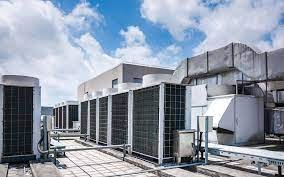Understanding the Different Types of HVAC Systems for Commercial Use

Introduction:
Choosing the right HVAC (Heating, Ventilation, and Air Conditioning) system is crucial for any commercial building. Whether it’s an office, retail store, restaurant, or industrial facility, a properly selected HVAC system ensures optimal indoor comfort, energy efficiency, and long-term savings. In this blog, we’ll break down the main types of commercial HVAC systems, how they work, and what to consider when selecting the best option for your business.
1. Single Split System
Overview:
Single split systems are one of the most common HVAC solutions for small commercial spaces. Each indoor unit is paired with an outdoor compressor, and the system is designed to heat or cool individual rooms or zones.
Best For:
- Small offices
- Retail shops
- Cafés and restaurants
Pros:
- Affordable and easy to install
- Zoning capabilities
- Energy-efficient for small areas
Cons:
- Not ideal for larger buildings
- Multiple systems may be required for larger areas
2. Multi-Split System
Overview:
A multi-split system works like a single split system but allows multiple indoor units to connect to a single outdoor unit. This reduces the number of outdoor units needed while still offering zone control.
Best For:
- Medium-sized buildings
- Offices with multiple rooms
- Medical clinics
Pros:
- Saves exterior space
- Supports multiple indoor zones
- Aesthetic flexibility
Cons:
- More complex installation
- Higher upfront cost than single split
3. Variable Refrigerant Flow (VRF) or Variable Refrigerant Volume (VRV)
Overview:
VRF/VRV systems are advanced HVAC systems that use refrigerant as the cooling and heating medium. They can simultaneously heat and cool different zones in a building using one system.
Best For:
- Large office buildings
- Hotels and luxury retail
- Mixed-use commercial spaces
Pros:
- Extremely energy efficient
- Precise temperature control
- Quiet and space-saving
Cons:
- High initial investment
- Requires expert installation and maintenance
4. Packaged HVAC Systems
Overview:
Packaged systems combine all components—compressor, condenser, evaporator, and air handler—into a single unit, typically placed on the roof or outside the building.
Best For:
- Large open-plan spaces
- Warehouses
- Restaurants
Pros:
- Saves indoor space
- Simple installation
- Easy access for maintenance
Cons:
- Limited flexibility for zoning
- Can be affected by weather if not well-protected
5. Central HVAC Systems (Chillers and Boilers)
Overview:
Central systems use chillers (for cooling) and boilers (for heating), with air distributed through ductwork. These are typically found in very large facilities and are ideal for centralized control.
Best For:
- Hospitals
- Universities
- Large commercial buildings and campuses
Pros:
- Centralized control
- Suitable for very large buildings
- Long lifespan
Cons:
- High installation and maintenance cost
- Requires significant space for equipment
6. Ductless Mini-Split Systems
Overview:
Mini-split systems don’t use ductwork and are ideal for retrofits or small spaces. They consist of an outdoor compressor and one or more indoor air-handling units.
Best For:
- Individual offices
- Server rooms
- Older buildings without existing ductwork
Pros:
- Energy-efficient
- Quick installation
- Zoned temperature control
Cons:
- Not ideal for large buildings
- Aesthetically less appealing due to visible units
Factors to Consider When Choosing a Commercial HVAC System:
- Building Size and Layout: Larger buildings may require centralized or VRF systems, while smaller spaces can use split or mini-split systems.
- Zoning Requirements: Consider if different areas need separate temperature controls.
- Energy Efficiency: Look for ENERGY STAR® ratings and advanced control systems.
- Budget: Include both upfront installation and long-term maintenance costs.
- Maintenance Accessibility: Systems placed on rooftops or in tight areas should be easy to access and service.
- Scalability: Choose systems that can grow with your business.
Conclusion:
Selecting the right commercial HVAC system for your commercial space is a decision that impacts not only comfort but also energy usage and operational costs. By understanding the different types of systems available—along with their pros, cons, and ideal use cases—you can make an informed choice that aligns with your business needs and budget.
Need help determining the best HVAC system for your commercial property?
Our team of commercial HVAC experts is here to guide you through every step—from system selection and installation to ongoing maintenance and support.




